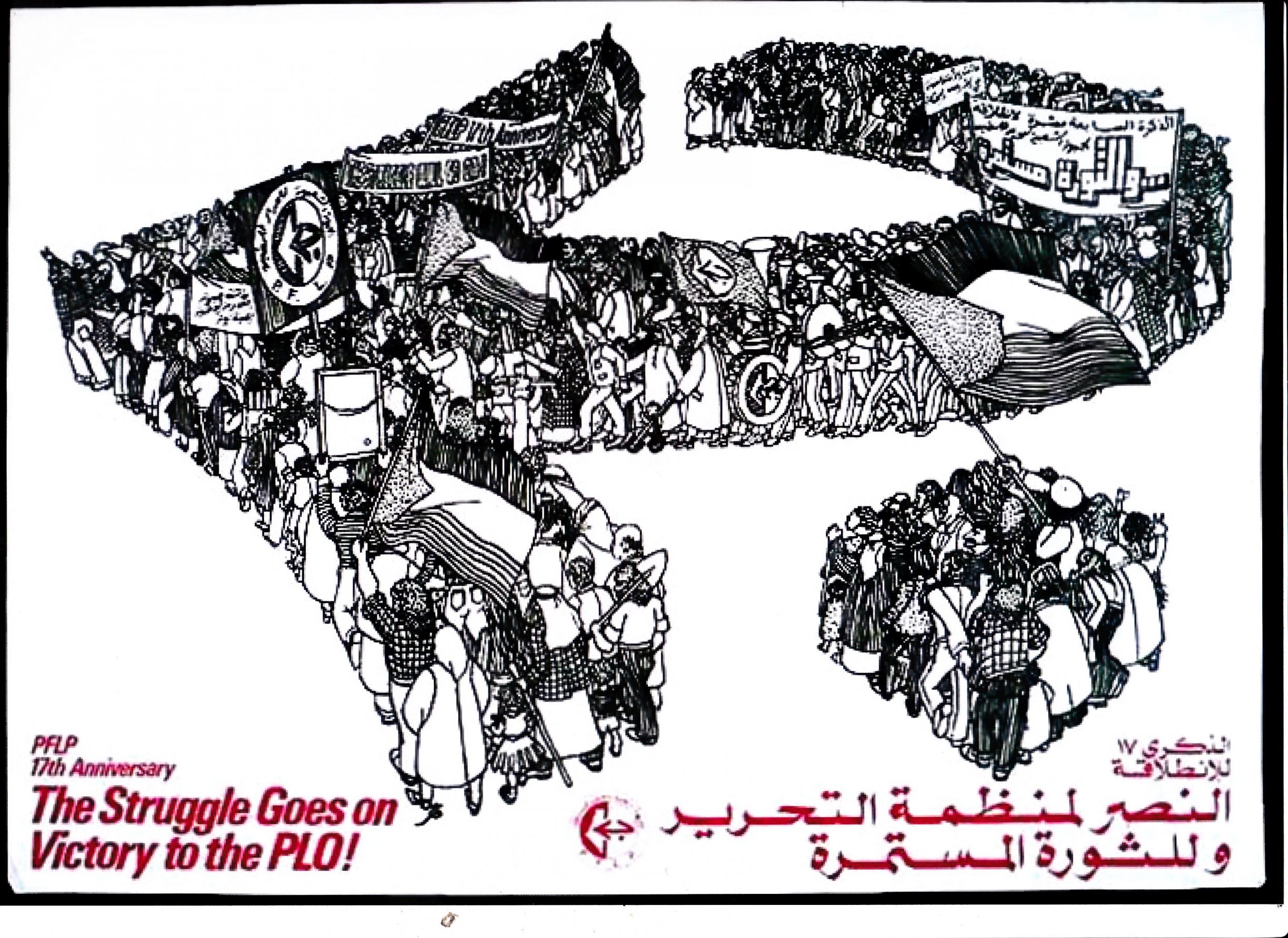
Forord
Popular Front for the Liberation of Palestine, PFLP, dannes 11. december 1967, som en reaktion på det palæstinensiske nederlag 5. juni 1967 (Seksdageskrigen).
PFLP har rødder i den pan-arabiske bevægelse Arab Nationalist Movement, ANM, der også var ophav til en række afdelinger i de fleste arabiske lande, bla. PFLO i Oman og National Liberation Front, NLF, i Sydjemen, der i 1969 var i stand til at smide de britiske kolonister ud, og danne People’s Democratic Republic of Yemen (PDRY).
PFLP blev hurtigt den stærkeste venstrefløjsorganisation, med et globalt syn på kampen mod kolonimagten Israel. De så både kampen mod imperialismen og de arabiske reaktionære magter, som en forudsætning for en sejr i Palæstina. De ønsker en demokratisk sekulær stat, med plads til både muslimer, jøder og kristne, og har altid arbejdet tæt sammen med israelere og folk med jødisk baggrund i andre lande.
PFLP blev især kendt internationalt efter en række flykapringer i de første år, som satte Palæstina spørgsmålet på den internationale dagsorden.
Poul Mikael Allarp,
august 2018
Sidst redigeret april 2021
Efterår 2021: PFLPs engelsksprogede site er p.t. taget ned. Det betyder en del døde links herunder, som ikke er fundet andre steder. Vi følger situationen.
Foreword
The Popular Front for the Liberation of Palestine, PFLP, was formed on December 11, 1967, as a response to the Palestinian defeat of 5 June 1967 (Six-Day War).
PFLP has its roots in the pan-Arab movement Arab Nationalist Movement, ANM, which also originated in a number of departments in most Arab countries, including. PFLO in Oman and the National Liberation Front, NLF, in South Yemen, who in 1969 was able to throw out the British colonists and form the People’s Democratic Republic of Yemen (PDRY).
PFLP quickly became the strongest left-wing organization, with a global perspective of the struggle against the colonial state of Israel. They saw both the struggle against imperialism and the Arab reactionary forces, as a prerequisite for a victory in Palestine. They want a democratic secular state, accommodating both Muslims, Jews and Christians, and have always worked closely with Israelis and people with Jewish background in other countries.
PFLP became known internationally after a number of aircraft hijackings in the first years that put Palestine on the international agenda.
Poul Mikael Allarp,
August 2018
Last edited April 2021
Autumn 2021: PFLPs English-language site is currently taken down. This means some dead links below, which has not been found at other sites. We follow the situation.
Indhold
- Leksika
- Sites
- Documents
- Articles in English
- PFLP-dokumenter på dansk
- På dansk
- Flykapringer / Hijackings
- George Habash
- Leila Khaled
- Ghassan Kanafani
- Se også / See also
- Se også på / See also at Socialistisk Bibliotek
Leksika:
- Popular Front for the Liberation of Palestine (PFLP) (Leksikon.org)
- Folkefronten til Palæstinas befrielse (Wikipedia.dk)
- Popular Front for the Liberation of Palestine (Wikipedia.org)
- Arab Nationalist Movement (Wikipedia.org)
Sites:
Popular Front for the Liberation of Palestine (online at Internet Archive). In addition to the Arabic-language version, there are versions in English, French, Italian and Polish.
PFLP (online at Internet Archive). Here are important documents since the start, as well as talks of leading people like George Habash and Leila Khaled.
Historical Documents of the Popular Front for the Liberation of Palestine (online at Internet Archive).
“This documentation resource and archive exists to preserve, promote, and protect the historical documents, political legacy, and the present and future of the Palestinian revolution and the Palestinian left, specifically, the Popular Front for the Liberation of Palestine.”
Life in Struggle: Abu Ali Mustafa
Memorial site (online at Internet Archive). “Abu Ali Mustafa is a Palestinian leader and martyr, a symbol of steadfastness and persistence through all of the stages of the Palestinian revolution. Assassinated on 27 August 2001 by a US-made and provided helicopter-fired missile at the hands of the Israeli occupation military, Abu Ali Mustafa’s life as a revolutionary was cut short amid the rising Al-Aqsa Intifada.”
Section: The Popular Front for the Liberation of Palestine
The site collects posters from Palestinian organizations, but also some posters from other areas of the Middle East. In the PFLP context, it is mentioned here among other things. Many of the Swiss activist and artist Marc Rudin’s posters and magazine frontpages.
Origins of the PFLP Logo. By Vladimir Tamari (The Palestine Poster Project)
On how the logo was developed with sketches.
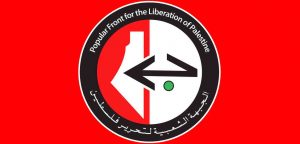
Dokuments:
P.F.L.P. Bulletin (1974-1983; online at Marxists Internet Archive) + Democratic Palestine (1984-1985; Ibid.)
The Popular Front after 50 Years: Strategy for the Liberation of Palestine. By Khaled Barakat (PFLP, November 20, 2017; online at Internet Archive)
Strategy for the Liberation of Palestine (online at Internet Archive)
“… published by the Popular Front for the Liberation of Palestine in February 1969. It was translated at that time by the PFLP Information Department and widely circulated in English and other languages. This comprehensive political and organizational document was prepared by the Second Congress of the PFLP.”
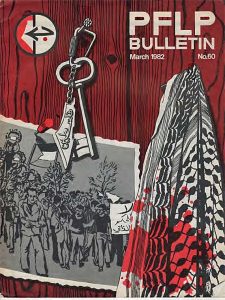
The Popular Front and External Operations. By Al Hadaf (1971, 17 p.; online at Internet Archive)
Pjece udgivet af Al Hadaf, Frontens teoretiske organ, hvor de gør status over de “externe oprationer” – bl.a. flykapringer.
Speech of Al Hakeem – Dr. George Habash. Amman – Jordan At Jordan International Hotel (12 June 1970; online at Internet Archive). Speech given after PFLP-units had occupyed the hotel and taken hostages after the Jordanian trops had attacked refugee camps. Dansk udgave se nedenfor.
Strategy for the Liberation of Palestine (February 1969; online at Internet Archive)
“The Strategy presents a full strategic vision for liberating Palestine, including a review of the enemy forces and the forces of the revolution; a class analysis of the Palestinian and Arab movements; a vision for a liberated Palestine; and close study of organizational questions for building a revolutionary party. It presents a clear vision of the Front and the Palestinian national liberation movement of its time and remains an important and useful analysis for the present.”
Founding Statement of the Popular Front for the Liberation of Palestine (11 December 1967; online at Internet Archive)
“The Founding Statement of the Popular Front for the Liberation of Palestine was issued on 11 December, 1967. This brief summary of the initiating principles of the PFLP marked the creation of the PFLP by setting forth its vision and goals.”
Articles in English:
‘Palestine, from the river to the sea’: interview with PFLP Gaza (Fight Racism! Fight Imperialism, 5 August 2024)
“Interview with Abu Kan’an, a comrade with media responsibilities in the Gaza branch of the Popular Front for the Liberation of Palestine (PFLP). The interview was carried out remotely during late June 2024.”
Strategies for liberation: old and new arguments in the Palestinian left. By Ramsis Kilani (International Socialism, Issue 183, Sommer 2024)
“In this article, I argue that the reasons for the decline of the historic organisations of the Palestinian left lie primarily in their prioritisation of military strategies, which made them dependent on the structures of the PLO.”
The Left has played a key role in the Palestinian struggle. By Francesco Saverio Leopardi (Jacobin, July 2, 2024)
“The rivalry between Fatah and Hamas has dominated Palestinian politics since the 1990s. Yet for many years, the main challenge to Fatah came from the groups of the Palestinian left, which have made a huge contribution to the national movement.”
The Palestinian Left: Past, present, and Future. By Torkil Lauesen (snylterstaten.dk, 15 March 2022)
An analysis and evaluation of the PFLP, the Palestine left and the struggle for the liberation of Palestine with starting point in the PFLP document: “Strategy for the Liberation of Palestine” (1969). The article was originally published at anti-imperialist.net, 15 march 2022. Torkil Lauesen is a long time activist at CWC and Manifest-CA i from the 60es and now at Internationalt Forum.
Victims of Propaganda: In Defense of the Palestinian Left. By Patrick (Robespierre Monument, April 19, 2016)
“Among those voices of resilience is that of the Marxist-Leninist Popular Front for the Liberation of Palestine (PFLP), which served as the vanguard for the Palestinian Revolution and forced, for a time, the Palestine Liberation Organization—of which it was the second largest member, behind only Yasser Arafat’s Fateh—to adopt a social program breaching the limits of bourgeois nationalism.”
PFLP soul-searching: The rise and fall of Palestine’s socialists. By Ramzy Baroud (The Palestine Chronicle, November 26, 2014). “The PFLP is back in the headlines after a recent attack in Jerusalem, raising questions about the current relevance of the group.”
Popular Front’s role wanes in Palestinian politics. By Daoud Kuttab (Al-Monitor, December 10, 2013)
“The PFLP is unlikely to regain its former footing or standing. Once it stood as the second most popular Palestinian faction, after Fatah. PFLP supporters carrying red flags with a map of historic Palestine on them continue to appear in demonstrations and at other public events, but their real power and impact has clearly diminished.”
Palestinian nationalism and the Arab revolution. By Phil Marshall (International Socialism, Issue 33, Autumn 1986, p.34-58; online at Marxists Internet Archive). “In order to understand why, for over 30 years, the leaders of the PLO have rejected this strategy, it is necessary to look at the origins and development of the national movement.”
PFLP-dokumenter på dansk:
Den palæstinensiske befrielseskamp. En antologi ved Jens Navntofte (Gyldendals Logbøger, Kbh. 1971, 272 s.)
En for datiden vigtigt og øjenåbnende materialesamling med interviews med centrale personer fra den palæstinensiske modstand og mange dokumenter, også fra PFLP. – ikke online.
PFLP forklarer… (Kbh., Futura 1970, 54 s.)
Indholder artikler fra PFLP om den palæstinensiske modstandskamp. Specielt er der en analyse og beskrivelse af de hårde kampe i juni 1970 mellem jordanske styrker og den palæstinensiske modstand i flygtningelejrene i Amman, der ledte frem til ‘Sorte September’ 1970, hvor modstandsbevægelsen bliver drevet ud af Jordan, for derefter at slå sig ned i Libanon. Online på Snylterstaten.dk.
George Habash’s tale på Continental Hotel. I PFLP forklarer… (se ovenfor) s. 37-40.
Talen blev givet efter at PFLP-enheder havde besat hotellet og taget gidsler i forbindelse med Jordans militære angreb på flygtningelejrene. Se mere om baggrunden i artiklen og i pjecen “PFLP forklarer …”
![PFLP parole "Vore Fjender er: Imperialismen, zionismen og de arabiske reaktionære" på dansk plakat lavet af Kommunistisk Ungdomsforbund, 1970 [Text in English: Our enemies are Imperialism, Zionism and the Arab Reactionaires]](https://socbib.dk/wp-content/uploads/2007/05/Plakat_Palestina1970_Vore_fjender_er-300x222.jpg)
Sammenfatning af PFLPs politiske manifest, vedtaget på kongres i august 1968. Online på Snylterstaten.dk.
Om flyaktioner (Ungkommunisten, 3. årgang, februar 1970, nr. 2, s. 20-21)
Indeholder uddrag af interview med George Habash i Der Spiegel. Online på Snylterstaten.dk.
Om en demokratisk stat i Palæstina (Ungkommunisten, 3. årgang, nr. 5, juni 1970, s. 19-22)
Online på Snylterstaten.dk
Tel al Za’atar (Manifest, nr. 7, 5. november 1979, s. 34-36)
Oversat fra PFLP-bulletin nr 30, august-september 1979. Om den fascistiske massakre på flygtningelejren Tel al Za’atar der startede med en belejring der begyndte d. 22 juni 1976 og sluttede d. 12. august med en massakre 4.000-5.000 mennesker i lejren.
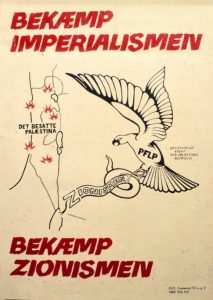
På dansk:
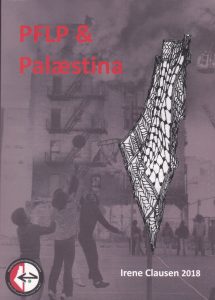
PFLP & Palæstina. Af Irene Clausen (Internationalt Forum, 2018, 433 sider, layout og tryk: Regnbue Tryk).
Bogen er nu tilgængelig online, som pdf, på Internationalt Forums site.
“Bogen beskriver den palæstinensiske modstandskamp i lyset af den zionistiske kolonisering af Palæstina. Ind imellem bringes beretninger fra PFLP’s kongresser. I en række temaartikler behandles spørgsmålene: kvindekamp og faglig kamp under besættelse, palæstinensernes ret til tilbagevenden og modstandsformer og terrorspørgsmålet.” Interviews med PFLP-aktivister.
Anmeldelser:
Boganmeldelse: PFLP og Palæstina. Af Asbjørn Nielsen (Konfront, 21. november 2018)
“Den bør læses af enhver med bare en perifer interesse i den palæstinensiske sag og venstrefløjen i Mellemøsten.“
“Nyt ambitiøst værk om PFLPs og Palæstinas historie har især kvalitet som faktuelt opslagsværk. Bogens opbygning gør, sammen med de komplicerede forhold i det mellemøstlige kludetæppe af stater og sociale kræfter, det vanskeligt at fastholde et sammenhængende billede.”
Boganmeldelse: Irene Clausen: ‘PFLP & Palæstina’. Af Alfred Lang (Autonom Infoservice, 19. december 2018)
“Et værk der suverænt og engageret guider læseren igennem den palæstinensiske modstands yderst komplekse historie …”
Grundig indsigt i PFLP og palæstinakonflikten. Af Elin Søborg (Kommunist, nr. 2-2019)
“Bogen er lidt af en mursten og med sit noget akademiske sprog ikke den, man skal starte med, hvis man ikke ved noget om konflikten. Men for dem, der har fulgt den tæt gennem årene, er der meget viden at hente i denne udogmatiske, marxistiske tilgang til nogle af de vigtigste politiske kæmpere i en af de mest betydningsfulde konflikter i det 20. og 21. århundrede.”
Vi er ikke terrorister. Af Anders Fenger (Arbejderen, 22. september 2012)
Interview med Abla Rasool fra PFLP, der er gift med Ahmad Sa’adat, der er generalsekretær i PFLP og idømt 30 års fængsel i Israel.
Gaza befinder sig i en blindgyde. Af Nicolas Pasadena (Modkraft.dk, 2. juni 2010)
Interview med den palæstinensiske flygtning Ghassan Ali, der er libertær kommunist og medlem af PFLP. Om PFLP og venstrefløjens situation.
Marxister og islamister kæmper side om side i Gaza (Modkraft.dk, 6. januar 2009)
“Det er ikke kun Hamas, der i disse dage fører væbnet kamp mod de israelske invasionsstyrker i Gaza, men en broget koalition af militante palæstinensiske grupper, herunder Abu Ali Mustafa-brigaden, den væbnede gren af det sekulære, marxistisk funderede PFLP. Det fortæller Albert Jensen fra organisationen Fighters+Lovers til Modkraft.dk.”
Israel/Palæstina konflikten og PFLP’s rolle heri (pdf). I: Modrapporter: FARC & PFLP. (Fighters+Lovers, maj 2008; online på Information.dk). Afsnit 2: “PFLP” (s.48-66). Baggrundsinformation udarbejdet af de sigtede i forbindelse med retssagen mod Fighters+Lovers.
Jødisk historiker: PFLP er en legitim oprørsbevægelse. Af Nina Trige Andersen (Information, 15. november 2007)
“PFLP opgav terror som middel i 1970’erne og er imod selvmordsbomber og angreb på civile, sagde et af forsvarets vidner, den jødisk-israelske historiker Ilan Pape, på retsmødet i Fighters+Lovers-sagen i går.”
Interview: En tredje Intifada? Af Modkraft (Modkraft.dk, 26. oktober 2004)
Interview med medlem af PFLP Ghassan Andoni. der er medstifter af International Solidarity Movement (ISM) – et netværk af internationale fredsvagter og palæstinensere i de besatte områder, der ved hjælp af ikke-voldelige ulydighedsaktioner prøver at lette palæstinensernes hverdag og sætte fokus på besættelsens konsekvenser. Han var også aktiv i den første intifada.
PFLP: »Vi er ikke lakajer« (Modkraft.dk, 6. maj 2003)
“PFLP kæmper på mange forskellige niveauer. Kulturelt, militært og så videre. Det er en lang kamp. Det vi ønsker, er demokrati. En palæstinensisk stat for arabere og for jøder. Det er den eneste løsning på det palæstinensiske problem. Det jødiske problem er Europas – ikke palæstinensernes.”
Sharon bad om det. Af Modkraft (Modkraft.dk, 1. oktober 2002)
Interview med PFLP-medlem om EUs terrorstempling af palæstinensiske organisationer, herunder PFLP.
Palæstinas venstrefløj (Autonomt Infoservice, 11. juni 2009)
Artikel-serien består af:
1. Den Den palæstinensiske venstrefløj med udgangspunkt i staten israel
2. PFLP og DFLPs historie og politik
3. Palæstinas kvinder
4. Den palæstinensiske venstrefløjs forgreninger
5. Den palæstinensiske venstrefløj og Oslo-aftalen
Oprindelig skrevet i 2002.
Hijackings:
The most spectacular of the Front’s aircraft hijackings took place on the 6th – 13th of September 1970, and became the last, but Palestine was forever placed on the world map. A total of 5 aircraft attempted hijacked 3 were forced to “Revolution Airport” Dawson Airfield (established by the British colonial power) in the Jordanian desert, a plane was too big and instead landed in Cairo, and one plane hijacking fails – the captain Patrick Arguello is killed and Laila Khaled is brought to a prison in London, from which she was quickly released.
Links:
The Popular Front and External Operations (English). By Al Hadaf, 1971, 17 p.
Pamphlet published by Al Hadaf, Theoretical organ of the Front, where they make the status of “external operations” – including hijackings.
Wikipedia
Dawson’s Field hijackings
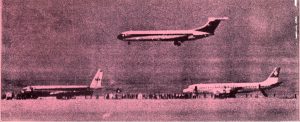
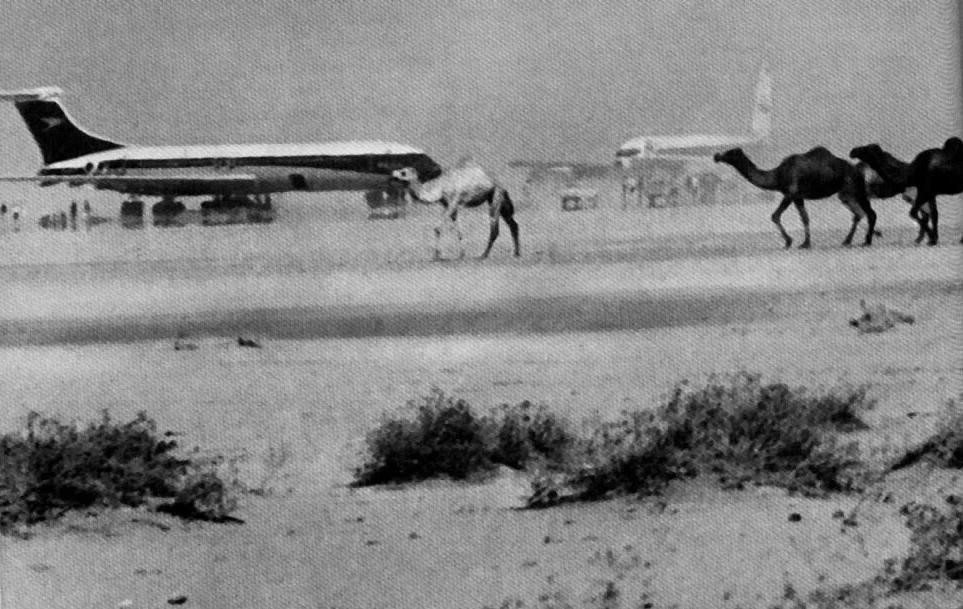

Black September | Three Planes Were Hijacked By The (PFLP), 20. maj 2017. (YouTube, 7:22 min.)
Guerrilla Hijackings: Deadline At Dawson’s Field (3:42). Film from AP Archive at Youtube
Leila Khaled on Marxism-Leninism and the PFLP (Youtube, 5:37) Interview with Leila Khaled.
George Habash (1925/1926? – 2008)
George Habash, stifteren af PFLP, Popular Front for the Liberation of Palestine/Folkefronten til Palæstinans Befrielse, og dets generalsekretær 1967-2000, fødes i Lydda, Palæstina 1. august 1925 (2. august 1926?) (senere: Lodv i Israel). Dør 26. januar 2008.
George Habash, founder of PFLP, Popular Front for the Liberation of Palestine, and its Secretary-General 1967-2000, born in Lydda, Palestine, August 1, 1925 (2 August 1926?) (Dies January 26, 2008).
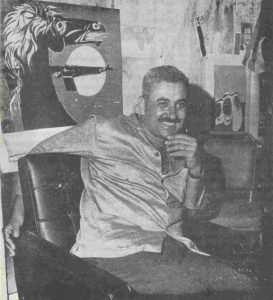
Se:
- Habash, Georges (Leksikon.org)
- George Habash (Wikipedia.org)
- George Habash. By Alain Gresh (PalestineRemembered.com/Encyclopedia of the Palestinians, November 12, 2000)
- PFLP. Sektion: George Habash, med taler og interviews (Popular Front for the Liberation of Palestine, PFLP; online at Internet Archive)
Nekrologer / Obituaries:
En frihedskæmper er død (pdf). Af Irene Clausen (Gaia, nr.59, forår 2008, s.30-31). “George Habash tegnede om nogen den palæstinensiske befrielseskamp og rangerede i palæstinensernes øjne på linje med ’den anden store’, Yassir Arafat.” Scroll ned.
Nekrolog: ”Den vise” er død. Af Lars Ploug (Modkraft/Kontradoxa, 29. januar 2008). “… nu har George Habash, endnu en af palæstinensernes store politikere fundet sit livs afslutning.”
De revolutionære dør aldrig. Af Irene Clausen + Udklip fra Georges Habash’ memoirer (Arbejderen.dk, 23. august 2008). “George Habash, grundlægger og mangeårig leder af PFLP – Folkefronten til Palæstinas Befrielse – fortæller i en ny bog om et halvt århundredes palæstinensisk befrielseskamp.” Omtale af Georges Habache, Les révolutionnaires ne meurent jamais – Conversations avec Georges Malbrunot (Fayard, 2008, 300 p.).
George Habash Obituary: 1916-2008. By Marcus Halaby (Fifth International, Vol.2, No.5, Summer 2008). “Here was someone an Arab patriot and secularist from a Christian background, a highly-educated man, and a self-declared Marxist and supporter of the oppressed, an opponent of Zionism and Western imperialism.”
The death of George Habash and the prospects for the Palestinian left. By an Israeli socialist (Workers’ Liberty, 28 February 2008). “Nonetheless, Habash was always committed to secularism, sympathized the labor movement in each country, opposed fundamentalism and regarded the Israelis as equal citizens in his idealistic vision of one socialist and secular republic.”
A Palestinian hero: George Habash – 1926-2008. By Kim Bullimore (Green Left Weekly, Issue 738, 6 February 2008). “Habash, popularly known as Al-Hakim (the wise one) was one of the most influential leaders of the Palestinian national liberation struggle.”
George Habash’s contribution to the Palestinian struggle. By As’ad AbuKhalil (The Electronic Intifada, 30 January 2008). “If there is a world revolutionary symbol for the second half of the 20th century, it should be George Habash.”
ILPS mourns the death of Dr. George Habash, Al-Hakeem, founder of the Popular Front for the Liberation of Palestine. By Jose Maria Sison (International Network for Philippine Studies, 28 January 2008; online at Internet Archive)
George Habash. By David Hirst (The Guardian, 27 January 2008). “In his later years, George Habash, who has died of a heart attack, at an age believed to be 82, was often known as ‘the conscience of the Palestine revolution’.”
The journey of Al-Hakim: 1925-2008 (Popular Front for the Liberation of Palestine, PFLP, 26 January 2008; online at Revolutionarydemocracy.org). “In 1993, when the Oslo agreement was signed, Comrade Al-Hakim called for maximum popular opposition to the agreement and saw in it a defeat to the Palestinian traditional leadership of the PLO.”
![George Habash square [Tulkarem?], Taken on 7 April 2011, Source: https://www.panoramio.com/photo/50717122. Author: Mujaddara. (CC BY-SA 3.0)](https://socbib.dk/wp-content/uploads/2007/05/George_Habash_sq_-_panoramio-1024x768.jpg)
Leila Khaled
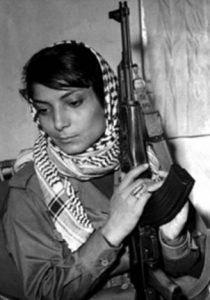
Palæstinensiske Leila Khaled fødes i Haifa 9 april 1944. Senere kendt som PFLP-medlem og flykaprer august 1969 og 6. september 1970, og medlem af det palæstinensiske nationalråd.
The Palestinian Leila Khaled was born in Haifa. Later known as PFLP member and hijacker in August 1969 and September 6, 1970, and member of the Palestinian National Council.
Se:
- Leila Khaled (Wikipedia.dk)
- Leila Khaled (Wikipedia.org)
- Leila Khaled : Information, links and references on Palestinian fighter Leila Khaled (site)
- Leila Khaled (The Palestine Poster Project Archives). Plakatsamling.
Palæstinensisk ikon. Af Svend Vestergaard Jensen (Socialistisk Information, 22. marts 2014). Anmeldelse af Sarah Irving: Leila Khaled – symbolet for Palæstinas befrielse (Forlaget Solidaritet, 2014, 218 sider).”Terrorist eller oprører? I hvert fald nåede den unge kvinde, Leila Khaled, et af sine tidlige mål i livet som flykaprer. Da hendes organisation, Folkefronten til Palæstinas Befrielse, PFLP, i 1970 afsluttede flykapring som taktik, var palæstinensernes elendige situation nået til verdens kendskab. Hvis de havde fortsat, ville aktioner som flykapringer, ifølge Leila Khaled, have den modsatte virkning.”
Se uddrag fra bogen: Leila Khaled fortæller (Arbejderen.dk, 9. april 2014).
Madame Terror taler ud. Af Hans Henrik Fafner (Samvirke, maj 2008, s.98-102; online på Internet Archive). “I dag har hun lagt Kalashnikoven på hylden og stiller spørgsmålstegn ved vold som politisk våben.”
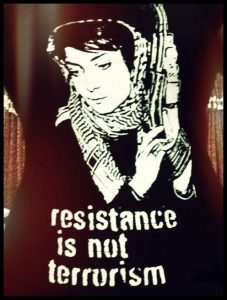
Ny film om Leila Khaled – den smukke flykaprer fra PFLP. Af Irene Clausen (Arbejderen, 5. april, 2008). “Ny film om hende mangler at fortælle mere om den palæstinensiske frihedsbevægelse.”
Leila Khaled — armed resistance for liberation. By Sarah Bates (Socialist Worker, 14 March 2022). “To mark International Women’s Day, Socialist Worker remembers Palestinian freedom fighter Leila Khaled.”
‘For me, Palestine is paradise’. By Frank Barat (Mondoweiss, April 7, 2014). An interview with Leila Khaled.
Leila Khaled, the 1970s Palestinian revolutionary, is still passionate. By Jennifer Jajeh (The National, February 16, 2013). “Once the poster girl of the Popular Front for the Liberation of Palestine and one of the most wanted women in the world, Leila Khaled now lives a somewhat quieter life in Jordan.”
PFLP leader Leila Khaled speaks out on Syria, imperialist intervention in Middle East. By Popular Front for the Liberation of Palestine (FightBack!News, February 4, 2013). “Leila Khaled, member of the Political Bureau of the Popular Front for the Liberation of Palestine, concluded a five-day visit to Turkey …”
Palestinian icon Leila Khaled denounces Syrian opposition (Democracy and Class Struggle, February 4, 2013). “She suggested that the Syrian opposition is part of a broader US foreign policy agenda in the Middle East …”
Palestinian hero Leila Khaled opposes US machinations in Mid East (Liberation, January 29, 2013). Interview: “We stand by the Syrian Army and the people of Syria.”
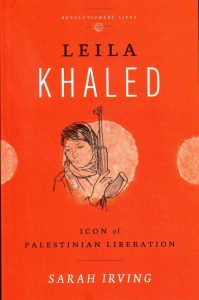
As’ad Abukhalil on Leila Khaled and Syria. By Sarah Irving (Sarah Irving Blog, January 28, 2013). “… I differ from her in that I believe that the removal of the current regime is key to meeting those demands.”
Leila Khaled: life of a revolutionary. By Riya Mary Al’Sanah (Socialist Review, Issue 371, July 2012). Review of Sarah Irving, Leila Khaled: Icon of Palestinian Liberation (Pluto Press, 2012, 128 p.) (Revolutionary Lives). “One of Irving’s main points of focus is Khaled’s gender and how this affected her and was reflected in her political activities.”
Women on the left: Leila Khaled (International Socialist Group, 14 May 2012; online at Internet Archive). “As Nakba day approaches, Gail MacKenzie looks back at the life and politics of a symbol of Palestinian resistance, revolutionary Leila Khaled.”
Resistance and revolution as lived daily experience. By Ziad Abu-Rish (Jadaliyya, September 12, 2011). An interview with Leila Khaled: Intro + Part 1-4.
Stay calm and no one gets hurt (pdf). By Josh Wood (Esquire, June 2010; online at Woodenbeirut.files.wordpress.com). “In a world where the word hijacking has become synonymous with terrorism, Khaled denies that she is or ever was a terrorist.”
‘Injustice every day’ (The Electronic Intifada, 7 January 2008). “… Khaled sat down with EI editor Matthew Cassel to discuss Annapolis, Nahr al-Bared, and how the Palestinian movement must move forward.”
Leila Khaled: Palestinian fighter, Marxist revolutionary. By Malena Hinze (Liberation, April 17, 2007). “She has dedicated her life to free Palestine from colonial occupation and to the international struggle for socialism.”
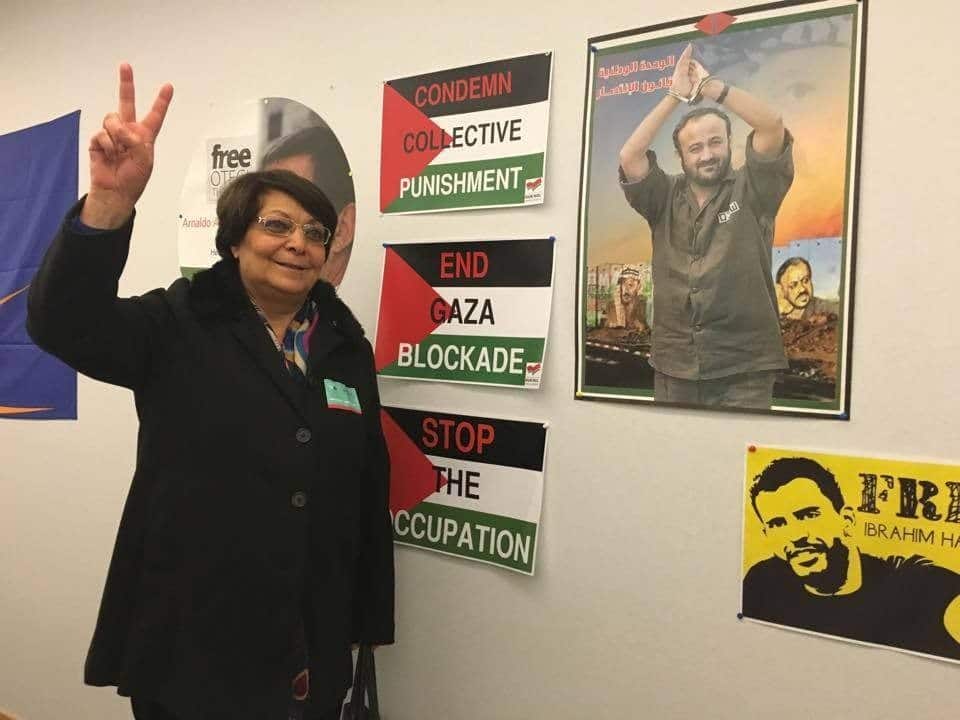
Imperialism’s two failures: Iraq and Lebanon (Workers World, October 12, 2006). “Following are excerpts from an interview conducted with Palestinian resistance leader Leila Khaled by Samia Halaby of the Defend Palestine Coalition, LeiLani Dowell of Workers World newspaper, and Sara Flounders of the International Action Center.”
A just solution is the way out of conflict – Leila Khaled (An Phoblacht, 11 August 2005). “During her trip Leila, who lives in exile in Amman, Jordan, gave a fascinating interview with An Phoblacht detailing her life in struggle and the prospects of a resolution of the Palestinian/Israeli conflict.”
Interview: Palestinian Leila Khaled. By Sana Abdallah (UPI, July 21, 2003). “In an interview with United Press International at her office in Amman’s middle-class commercial district of Jabal Hussein, she looked back at her life without regrets.”
My people shall live: The autobiography of a revolutionary (pdf). By Leila Khaled. Edited by George Hajjar (Hodder & Stoughton, 1973, 231 p.; online at Aktivist.nu/Internet Archive, 98 p.)
Video:
Video: Leila Khaled: Hijacker. The 2006 documentary on Leila Khaled, made by Lina Makboul (YouTube, 1:01:49 hour)
Leila Khaled Highjacker (filmsite)
Video: Leila Khaled interview part 1-4 (Workers Party, 29 August 2010, 9:59, 9:00, 8:46, 8:04 min.)
Leila Khaled on her Boycott, Divestment and Sanctions Movement tour (Youtube, 14:55)
Leila Khaled on Marxism-Leninism and the PFLP. (Youtube, 5:37)
Se også:
Living under occupation (Against the Current, Issue 159, July/August 2012). “Rabab Ibrahim Abdulhadi describes growing up in Palestine after the 1967 war, when Lelia Khaied emerged as a role model for young Palestinian girls.”
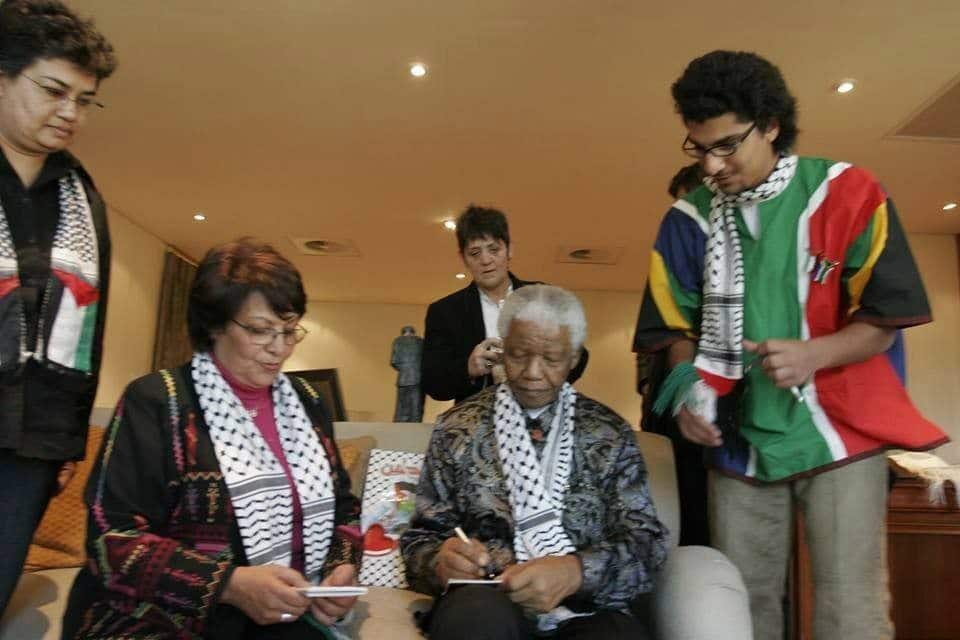
Ghassan Kanafani (9. april 1936 – 8. juli 1972)
Forfatteren Ghassan Kanafani, talsmand for PFLP, født i Acre i 1936, myrdes sammen med sin niece, Lamia, af en israelsk dødspatrulje med en bilbombe i Beirut, den 8. juli 1972. Ghassan Kanafani blev i 1961 gift med den danske pædagog Anni Kanafani, født Høver, der siden har drevet flere børnehaver i de palæstinensiske flygtningelejrene i Libanon. Dette arbejde fortsætter gennem Ghassan Kanafanis Kultur Fond (se nedenfor) og stadig under Anni Kanafani ledelse.
The author Ghassan Kanafani, spokesman for PFLP, born in Acre in 1936, murdered with his niece, Lamia, by an Israeli deathpatrol with a car bomb in Beirut, July 8, 1972. Ghassan Kanafani was married to the Danish educator Anni Kanafani, born Høver, who have since driven more kindergartens in the Palestinian refugee camps in Lebanon. This work continues through Ghassan Kanafani Culture Fund (see below) unde the leadership of Anni Kanafani.

Se:
- Biography of Gassan Kanafani. By Muin Rabbani (Encyclopedia of The Palestinians; PalestineRemembered.com)
- Ghassan Kanafani (1936-1972) (Marxists Internet Archive)
- Ghassan Kanafani (Wikipedia.org)
- Ghassan Kanafani (Foreningen til Støtte for Kanafanis Børnefond)
Resistance was Ghassan Kanafani’s only story. By Seraj Assi (Jacobin, July 9, 2024). “Novelist Ghassan Kanafani was assassinated by Mossad agents this week over 50 years ago. Exiled as a child during the Nakba, he would never return to Palestine — except in his fiction.”
The revolutionary life of Ghassan Kanafani: 50 years after Israel assassinated him (Counterfire, Michael Lavalette remembers the Palestinian revolutionary leader Ghassan Kanafani and his contribution to the struggle for Palestinian liberation 50 years on from his murder by Israeli forces.”
Ghassan Kanafani is a martyr to Palestinian freedom. By Julian Sayarer (Jacobin, July 8, 2022). “Today marks 50 years since Israeli agents murdered Ghassan Kanafani in Beirut. Their terrorist attack silenced the Palestinian writer — but failed to extinguish his people’s spirit of resistance.”
Ghassan Kanafani: Voice of Palestine (1936-1972). By Louis Brehony (The Palestine Chronicle, September 4, 2017). “Kanafani was one of the most important figures in 20th century literature. He was also a refugee, a revolutionary Marxist and an internationalist.”
Ghassan Kanafani: Revolutionary writer and journalist. By Raffaele Morgantini and Ricardo Vaz (Investig’Action, 21 July 2017). “In this essay we look at Kanafani’s life and work, the impact of his writing as a chronicling of the Palestinian struggle and the relevance of his political thought to this day.”
The second life of Ghassan Kanafani. By As’ad AbuKhalil (The Electronic Intifada, 12 July 2017). “On Arab social media, even among the young generation who are not accustomed to reading books, one notices him everywhere.”
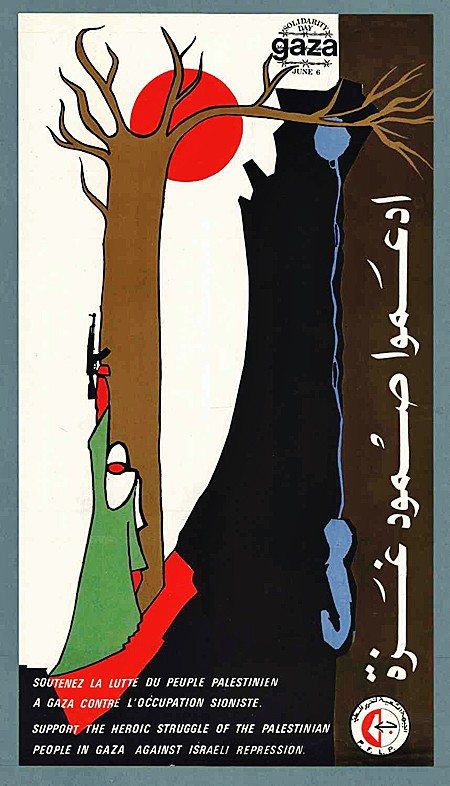
Ghassan Kanafani, the Palestinian Revolutionary killed by Israeli Intelligence (Telesur, 8 July 2017). “45 years ago, the Palestinian revolutionary and novelist Ghassan Kanafani was assassinated by Mossad, Israel’s national intelligence agency.”
43 years on the assassination of Comrade Ghassan Kanafani, revolutionary leader and writer (Popular Front for the Liberation of Palestine, 8 July 2015; online at Redline). “His clarity of vision prioritized and highlighted the necessary and revolutionary role of the Palestinian popular classes while exposing the role of Zionism, imperialism and Arab reaction.”
With thanks to Ghassan Kanafani. By Dalia Karpel (Haaretz, April 14, 2005). “Sami Michael’s new book, Yonim be’Trafalgar (Doves in Trafalgar), is based on the novel Return to Haifa, by Palestinian writer Ghassan Kanafani, published in 1969. Now, Michael tells why he chose Kanafani’s work and says he feels like the abandoned boy in the original book.”
The 1936-39 Revolt in Palestine (pdf). By Ghassan Kanafani (London, Tricontinental Society, 1980, 67 p., online at Internet Archive). With Introduction to G.K. (p.4-5) + The political writings of G.K. (p.6-7) + Letter from Gaza (p.61-64) + Tribute to G.K. (p.65-67). “Classic study of the 1936-1939 revolt in Palestine, with a class-based analysis of the revolutionary movement against British and Zionist colonization of Palestine”.
Videos
Ghassan Kanafani and the era of revolutionary Palestinian media | The Listening Post (Feature) 19. juli 2020. Al Jazeera English. (YouTube, 9:12 min.)
Interview with Ghassan Kanafani (6:57 min.)
Popular Front for the Liberation of Palestine spokesman Ghassan Kanafani interviewed by Richard Carleton, Beirut 1970. The conflict was fought between the Palestine Liberation Organisation under the leadership of Yasser Arafat, and the Jordanian Armed Forces under the leadership of King Hussein. See full transcripts of the interview (online at Internet Archive)
Letter From Gaza. By Ghassan Kanafani. John Berger reads Ghassan Kanafani’s Letter From Gaza. In an address to the inaugural Palestine Festival of Literature (2008) John Berger gives a moving reading of Ghassan Kanafani’s “Letter from Gaza” Film: Perry Ogden Photographs: Stefano Massimo & Rula Halawani Title Cards: Yves Berger. (YouTube, 17:24 min.). See the text her: “Letter from Gaza” (Marxists.org)
Se også:
Foreningen til Støtte for Kanafanis Børnefond (Kanafani.dk). Dansk fond til støtte for Anni Kanafani’s libanesiske NGO Ghassan Kanafani Cultural Foundation (GKCF).
Litteratur:
På dansk
- Mænd i solen. Af Ghassan Kanafani (Rhodos, 1990, 87 s., illustreret). Roman.
- Alt hvad I har tilbage. Af Ghassan Kanafani (Rhodos, 1981, 168 s., illustreret). Noveller. Indhold: De sørgmodige appelsiners land; Kagesælgeren; Bruden; Knægten låner sin morbrors bøsse og drager østpå til Safad; Alt hvad I har tilbage; Tilbage til Haifa; Aprilblomster.
In English:
- Palestine’s Children: Returning to Haifa and other stories. By Ghassan Kanafani (Lynne Rienner Publishers, 2000, 160 p.)
- The Little Lanterne. By Ghassan Kanafani (Ghassan Kanafani Cultural Foundation, 2005, 71 p.)
Teater
Som et stykke kammermusik. 23. august 2014Den håbløse konflikt mellem jøder og palæstinenser blotlægges med matematisk klarhed i familiedramaet ’Tilbage til Haifa’ på teatret ’Møllen’ i Haderslev.”
Følelseshvirvel i Møllen. Af Anne Middelboe Christensen (Teateravisen.dk, 18 oktober 2014) “‘Tilbage til Haifa’ er en kærlighedsintens jubilæumsforestilling fra Teatret Møllen. Fyldt med uløselige dilemmaer fra et besat Palæstina – fortolket som nutidigt teater om mennesker til alle tider.”
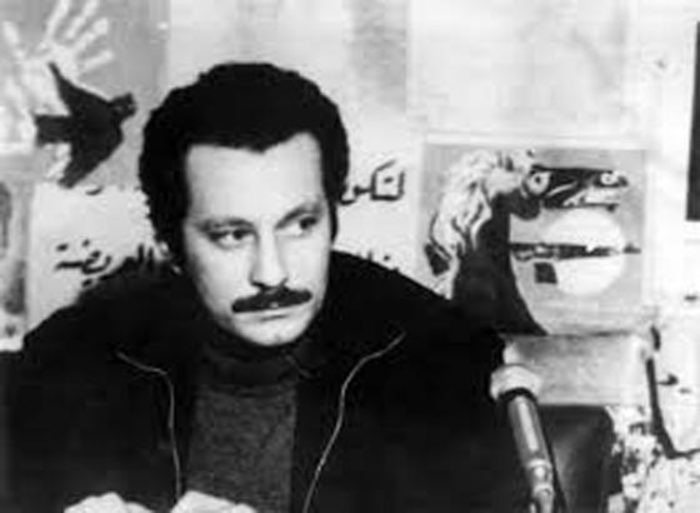
Se også / see also:
Turning Money into Rebellion: The Unlikely Story of Denmark’s Revolutionary Bank Robbers. Redigeret af Gabriel Kuhn. Udgivet af PM Press/Kersplebedeb, 2014, 240 s., ill.
Book about the Danish Blekingegade Gang, that made money for PFLP via robberies. Some parts of the book is online here at snylterstaten.dk. The central interview, where some members of the group tells about their cooperation with PFLP, are not online. The book is available in a German and Swedish edition.
Det handler om politik. Af Niels Jørgensen, Torkil Lauesen og Jan Weimann. Oprindelig offentliggjort i tidsskriftet Social Kritik, nr. 117, marts 2009, s. 4-61 (Tema: Blekingegade – tyve års dobbeltliv).
Blekingegadegruppens svar på Peter Øvig Knudsens bog om gruppen, men indeholder også en del om PFLP. Online i opdateret udg. på Snylterstaten.dk. English edition: It Is All About Politics. A little shorter version, made for the book Turning Money into Rebellion: The Unlikely Story of Denmark’s Revolutionary Bank Robbers. Redigeret af Gabriel Kuhn. Udgivet af PM Press/Kersplebedeb, 2014, 240 s., ill. [Snylterstaten.dk er p.t. ved at blive redesignet, men titlen kan findes på Internet Archive]
Se også på / See also at Socialistisk Bibliotek:
- Emneoversigten: Palæstina / Israel
- Linkboxen: Zionisme – Antizionisme: Historien om racisme og etnisk fordrivelse
- Tidslinjen: 5. juni 1967, om Seksdageskrigen – Israels præventive krig mod Ægypten
- Linkboxen: 9th June – Den glemte krig i Oman / The forgotten war in Oman
















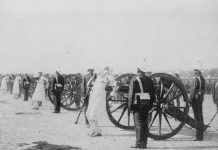
![George Habash square [Tulkarem?], Taken on 7 April 2011, Source: https://www.panoramio.com/photo/50717122. Author: Mujaddara. (CC BY-SA 3.0)](https://socbib.dk/wp-content/uploads/2007/05/George_Habash_sq_-_panoramio-218x150.jpg)
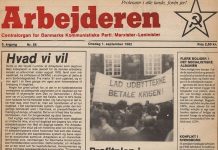
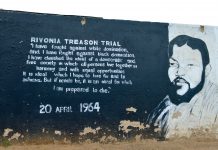
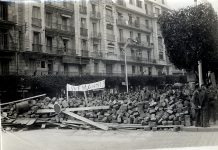
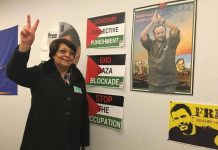










![A demonstration of workers from the Putilov plant in Petrograd (modern day St. Peterburg), Russia, during the February Revolution. The left banner reads (misspelt) "Feed [plural imperative] the children of the defenders of the motherland"; the right banner, "Increase payments to the soldiers' families - defenders of freedom and world peace". Both refer to the economic toll the First World War was having on civilian life, February 1917 (probably around March 7 [O.S. February 22]) Photo: Unknown. Public Domain.](https://socbib.dk/wp-content/uploads/2007/04/1917-februarrevolution2.1500x0-100x70.jpg)
[…] several Internationalt Forum organizers, including Irene Clausen, the author of the new book “PFLP and Palestine,” for a meeting with Christian Juhl, a member of the Danish Parliament representing the […]
Comments are closed.